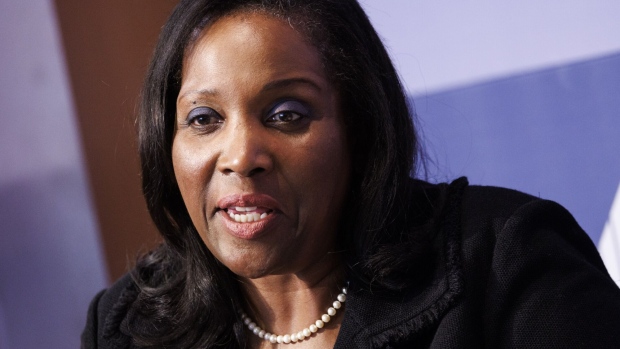Apr 3, 2023
Fed’s Lisa Cook Says Inflation Is Easing but More Is Needed
, Bloomberg News

(Bloomberg) -- Federal Reserve Governor Lisa Cook said US inflation has started easing but price pressures could keep emanating from a tight labor market, the war in Ukraine and the reopening of China.
“We certainly see tightening taking place,” Cook said Monday during an event organized by the University of Michigan Economics Department, citing a slowdown in housing and credit tightening that was underway before the recent banking issues as a result of the Fed’s rapid rate increases.
Given the strength of the labor market, “we are still going to see inflation from that, but we’ve seen wage gains moderating quite a bit,” she said. That suggests the “disinflationary process” is underway, the Fed governor said, but “we’re not there yet.”
Policymakers are continuing their fight against inflation, which they say remains a top concern, even as they acknowledge the uncertainty over how much recent banking turmoil will slow the economy. Inflation soared to a 40-year high in 2022 and has moderated since then but is still elevated, with the Fed’s preferred inflation measure running at more than two times the central bank’s 2% target.
Fed officials raised interest rates by a quarter percentage point last month, bringing their policy benchmark to a target range of 4.75% to 5%, up from near zero a year earlier. Forecasts released at the same time show the 18 officials expect rates to reach 5.1% by year-end, according to their median projection, implying one more 25 basis-point hike.
Inflation Focus
While the Fed has a dual mandate of promoting price stability and maximum employment, the central bank is “focused on high inflation because the job market seems to be doing okay,” Cook said.
“If at some point there is attention that needs to be paid to one side of the dual mandate then that needs to be done,” Cook said. “That is temporary, but that’s the situation we have right now.”
The Fed’s latest rate increase came after the US government stepped in to guarantee deposits at two failed firms and after the Fed introduced a new emergency-lending program to support other banks. The Fed also worked to boost international access to dollars by enhancing swap lines with its key central bank counterparts.
Cook said it will be important to watch how much more credit tightens as a result of the uncertainty, a shift that could be especially painful for small businesses. However, she said there would not necessarily be a “steep decline in GDP” because of that tightening and that officials need to keep monitoring economic data.
(Updates with comment from Cook in third paragraph.)
©2023 Bloomberg L.P.